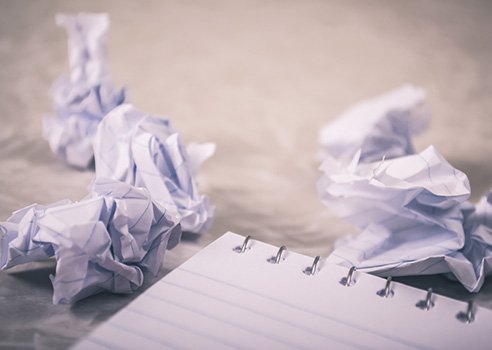Word count: 563 words
Reading time: Just over 2 minutes
Do you procrastinate about writing because you’re afraid of making mistakes? That, perhaps, is the biggest mistake of all….
Many years ago, I tried to learn how to ski. I’m the kind of person most others describe as “bookish” – definitely not an athlete – so I never learned to soar down hills and execute perfect parallel turns. In fact, it was a good day when I wasn’t lying on my back with my skis twisted across my body.
One of my friends at the time, however, developed the perfect, supportive question. “Did you fall forward today?” he’d ask. Yup. He’d defined me – accurately, I must confess — as the type of skier who typically tried to lean backwards. His question demonstrated two of the great truths of skiing.
First, to fall forward, you need to be leaning forward, which makes you less likely to fall. Second, there is no shame in falling.
Just as you should lean forward when skiing, so you should in writing. Don’t be afraid of making mistakes. Instead, welcome the chance to fall. Here are the reasons why:
1) We become less fearful. When we’ve fallen a number of times, we learn there’s usually no huge amount of pain involved. It’s more of a nuisance than anything else. So we write a first draft of something that doesn’t work or is even flat-out wrong. What’s the big deal? We can always rewrite it! But we won’t write any better until we learn to take some risks and try writing it differently.
2) We learn more. Most of us welcome the idea of winning awards or being buried in praise by our clients, bosses and peers, but I find I always learn more from mistakes than anything I’ve done well. Once, in my daily newspaper days, I remember writing “they’re” when I meant “their.” I knew the difference – I’d just been working too quickly. Unfortunately, no editor caught the error and it was published. In a story about a famous writer. Talk about embarrassing! My mistake, however, taught me to be infinitely more careful with homophones.
3) It teaches us to forgive. Making mistakes is part of the human condition. If we can forgive ourselves (and forgive others), our lives become much more pleasant. And, by the way, who wants to be perfect? Perfection leaves no room for improvement.
4) Mistakes mean we’re progressing. As we make mistakes and continue to learn, our writing slowly improves. Often, we don’t see the change – in the same way we don’t see changes in our children or our parents, unless we’ve been away from them for a time. The bad news is we’re all too close to our own writing to truly be able to judge it. And the good news? If we’re making mistakes, we can be confident that we’re also making progress.
5) We’ll create a positive, self-perpetuating loop. If we refuse to be stopped by the fear of making mistakes here’s how things will work out: We write. We make mistakes. We learn from them. We write differently. We make new mistakes. We learn from them. We write differently. We make new mistakes. We learn from them. We write differently…. (Note: You do have to be willing to LEARN for this to work!)
In fact, there are very few downsides to making mistakes while writing. The real mistake is to pretend we’re not going to make any. Or, far worse, not to write at all.


